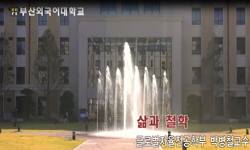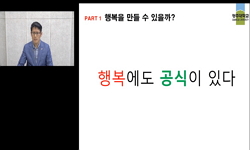This study examined effect of counterfactual thinking about positive experiences on meaning in life and subjective well-being. For this purpose, 349 college students were assigned into three groups. The experimental group performed counterfactual thin...
http://chineseinput.net/에서 pinyin(병음)방식으로 중국어를 변환할 수 있습니다.
변환된 중국어를 복사하여 사용하시면 됩니다.
- 中文 을 입력하시려면 zhongwen을 입력하시고 space를누르시면됩니다.
- 北京 을 입력하시려면 beijing을 입력하시고 space를 누르시면 됩니다.

긍정적 경험에 대한 사후가정사고가 삶의 의미와 주관적 안녕감에 미치는 영향 = The Effect of Counterfactual Thinking about Positive Experiences on Meaning in Life and Subjective Well-being
한글로보기https://www.riss.kr/link?id=A104105100
- 저자
- 발행기관
- 학술지명
- 권호사항
-
발행연도
2014
-
작성언어
Korean
- 주제어
-
등재정보
KCI등재
-
자료형태
학술저널
-
수록면
953-971(19쪽)
-
KCI 피인용횟수
3
- 제공처
-
0
상세조회 -
0
다운로드
부가정보
다국어 초록 (Multilingual Abstract)
This study examined effect of counterfactual thinking about positive experiences on meaning in life and subjective well-being. For this purpose, 349 college students were assigned into three groups. The experimental group performed counterfactual thinking whereas the comparing group performed factual thinking after reflecting on positive experiences. The control group reported their opinions on an event with neutral valence. To examine effect of these distinct interventions, the three groups responded to presence of meaning and subjective well-being scales. The results of this study were as follows. The counterfactual thinking group presented significantly greater presence of meaning in life and positive affect than the factual thinking and control groups. Additionally, the counterfactual thinking group presented significantly greater satisfaction in life than the control group. Finally, implications and limitations of this study are discussed with suggestions for future research.
국문 초록 (Abstract)
본 연구는 긍정적 경험에 대한 사후가정사고가 삶의 의미와 주관적 안녕감에 미치는 영향을 살펴보았다. 이를 위해 349명의 대학생들을 대상으로 사전 설문을 하여 동질성 검정 이후 집단별 ...
본 연구는 긍정적 경험에 대한 사후가정사고가 삶의 의미와 주관적 안녕감에 미치는 영향을 살펴보았다. 이를 위해 349명의 대학생들을 대상으로 사전 설문을 하여 동질성 검정 이후 집단별 처치를 실시하였다. 실험집단은 긍정적 경험을 회상한 후 사후가정사고 처치를 하였고, 비교집단은 긍정적 경험을 회상한 후 사실적 사고 처치를 하였다. 통제집단은 중립적 경험에 대하여 의견을 기술하는 처치를 하였다. 측정도구로는 삶의 의미 척도와 주관적 안녕감 척도를 사용하였다. 사전 설문 후 집단 동질성을 검정하기 위하여 일원변량분석을 실시하였고, 집단별 처치 후 다변량 분산분석을 실시하였다. 본 연구의 결과는 다음과 같다. 첫째, 긍정적 경험에 대하여 사후가정사고 처치를 한 실험집단이 비교집단과 통제집단보다 유의하게 높은 삶의 의미 발견과 긍정 정서를 나타냈다. 둘째, 긍정적 경험에 대하여 사후가정사고 처치를 한 실험집단이 통제집단보다 유의하게 높은 삶의 만족을 나타내었다. 끝으로 본 연구의 의의 및 제한점과 향후 연구방향을 기술하였다.
참고문헌 (Reference)
1 이현희, "한국판 정적 정서 및 부적 정서 척도 (Positive Affect and Negative Affect Schedule; PANAS)의 타당화 연구" 한국임상심리학회 22 (22): 935-946, 2003
2 원두리, "한국판 삶의 의미척도의 타당화 연구: 대학생을 대상으로" 한국건강심리학회 10 (10): 211-225, 2005
3 김경희, "의미추구와 긍정정서가 의미발견에 미치는 영향" 한국심리학회 32 (32): 107-124, 2013
4 심미성, "스트레스 완충자원으로서 삶의 의미의 역할" 가톨릭대학교 2006
5 류연지, "성격 및 욕구수준이 주관적 안녕에 미치는 영향" 연세대학교 1996
6 허태균, "사후가정사고의 심리적 기능과 응용적 가치" 한국문화및사회문제심리학회 8 (8): 171-190, 2002
7 오은아, "사후가정사고와 사고통제방략이 외상 후 성장에 미치는 영향" 한국건강심리학회 16 (16): 577-593, 2011
8 김경미, "보육교사 교육생의 감사편지 쓰기 효과" 한국상담심리학회 24 (24): 807-825, 2012
9 한소영, "대학생이 지각한 부모-자녀 관계에서의 기본 심리적 욕구 만족감이 주관적 안녕감에 미치는 영향" 한국상담심리학회 21 (21): 439-464, 2009
1 이현희, "한국판 정적 정서 및 부적 정서 척도 (Positive Affect and Negative Affect Schedule; PANAS)의 타당화 연구" 한국임상심리학회 22 (22): 935-946, 2003
2 원두리, "한국판 삶의 의미척도의 타당화 연구: 대학생을 대상으로" 한국건강심리학회 10 (10): 211-225, 2005
3 김경희, "의미추구와 긍정정서가 의미발견에 미치는 영향" 한국심리학회 32 (32): 107-124, 2013
4 심미성, "스트레스 완충자원으로서 삶의 의미의 역할" 가톨릭대학교 2006
5 류연지, "성격 및 욕구수준이 주관적 안녕에 미치는 영향" 연세대학교 1996
6 허태균, "사후가정사고의 심리적 기능과 응용적 가치" 한국문화및사회문제심리학회 8 (8): 171-190, 2002
7 오은아, "사후가정사고와 사고통제방략이 외상 후 성장에 미치는 영향" 한국건강심리학회 16 (16): 577-593, 2011
8 김경미, "보육교사 교육생의 감사편지 쓰기 효과" 한국상담심리학회 24 (24): 807-825, 2012
9 한소영, "대학생이 지각한 부모-자녀 관계에서의 기본 심리적 욕구 만족감이 주관적 안녕감에 미치는 영향" 한국상담심리학회 21 (21): 439-464, 2009
10 李宥姃, "性格特質이 氣分의 수준 및 변화성에 미치는 영향" 중앙대학교 1995
11 King, L. A., "What makes a life good?" 75 : 156-165, 1998
12 Rozin, P., "Well-being: the foundations of hedonic psychology" Russell Sage Foundation 109-133, 1999
13 Kray, L. J., "Thinking inside the box : The relational processing style elicited by counterfactual mind-sets" 95 : 1217-1224, 2006
14 Bradburn, N. M., "The structure of psychological well-being" Aldine 1969
15 Diener, E., "The satisfaction with life scale" 49 : 71-75, 1985
16 Fredrickson, B. L., "The role of positive emotions in positive psychology : The broaden-and-build theory of positive emotions" 56 : 218-226, 2001
17 Mascaro, N., "The role of existential meaning as a buffer against stress" 46 : 168-190, 2006
18 Gleicher, F., "The role of counterfactual thinking in judgments of affect" 16 : 284-295, 1990
19 Markman, K. D., "The mental simulation of better and worse possible worlds" 29 : 87-109, 1993
20 Diener, E., "The independence of positive and negative affect" 69 : 851-864, 1984
21 Burton, C. M., "The health benefits of writing about intensely positive experiences" 38 : 150-163, 2004
22 Epstude, K., "The functional theory of counterfactual thinking" 12 : 168-192, 2008
23 Battista, J., "The development of meaning in life" 36 : 409-427, 1973
24 Steger, M. F., "The development and validation of the meaning in life questionnaire"
25 King, L. A., "The detection and construction of meaning in life events" 4 : 317-330, 2009
26 Lyubomirsky, S., "The costs and benefits of writing, talking, and thinking about life’s triumphs and defeats" 90 : 692-708, 2006
27 Routledge, C., "The Past Makes the Present Meaningful : Nostalgia as Existential Resource" 101 : 638-652, 2011
28 Steger, M. F., "The Meaning in Life Questionnaire : Assessing the presence of and search for meaning in life" 53 (53): 80-93, 2006
29 Janoff-Bulman, R., "Shattered assumptions:Towards a new psychology of trauma" The Free Press 1992
30 Currier, J., "Sense-making, grief, and the experience of violent loss : Toward a mediational model" 30 : 403-428, 2006
31 Zika, S., "Relation of hassles and personality to subjective well-being" 53 : 155-162, 1987
32 Kashdan, T. B., "Reconsidering happiness : The costs of distinguishing between hedonics and eudaimonia" 3 : 219-233, 2008
33 Seligman, M. E. P., "Positive psychology progress : Empirical validation of interventions" 60 (60): 410-421, 2005
34 King, L. A., "Positive affect and the experience of meaning in life" 90 : 179-196, 2006
35 Steger, M. F., "Oxford handbook of positive psychology" Oxford University Press 679-687, 2009
36 Debats, D. L., "On the psychometric properties of the Life Regard Index(LRI) : a measure of meaningful life" 14 : 337-345, 1993
37 Warr, P., "On the independence of negative and positive affect" 44 : 644-651, 1983
38 Wong, P. T. P., "Meaning therapy : an integrative and positive existential psychotherapy" 40 : 85-93, 2010
39 Heine, S. J., "Meaning maintenance model : On the coherence of human motivations" 10 : 88-110, 2006
40 Frankl, V. E., "Man’s search for meaning" First Washington Square Press 1984
41 Park, C. L., "Making Sense of the meaning literature : An integrative review of meaning making and its effects on adjustment to stressful life events" 136 : 257-301, 2010
42 Teigen, K. H., "Luck, envy, and gratitude : It could have been different" 38 : 235-248, 1997
43 Einhorn, H. J., "Judging probable cause" 99 : 3-19, 1986
44 Koo, M., "It's a wonderful life : Mentally subtracting positive events improves people's affective states, contrary to their forecasts" 95 : 1217-1224, 2008
45 Markman, K. D., "Implications of counterfactual structure for creative generation and analytical problem solving" 33 : 312-324, 2007
46 Shrira, A., "How subjective well-being and meaning in life interact in the hostile world?" 6 : 273-285, 2011
47 Baumeister, R. F., "Handbook of positive psychology" Oxford University Press 608-618, 2002
48 Kray, L. J., "From What might have been to what must have been : Counterfactual thinking creates meaning" 98 : 106-118, 2010
49 Hasher, L., "Frequency and the conference of referential validity" 16 : 107-112, 1977
50 Debats, D. L., "Experiences of meaning in life : A combined qualitative and quantitative approach" 86 : 359-374, 1995
51 Giannopoulos, V. L., "Effects of positive interventions and orientations to happiness on subjective well-being" 6 (6): 95-105, 2011
52 Watson, D., "Development and validation of brief measures of Positive and Negative Affect : The PANAS Scales" 54 : 1063-1070, 1988
53 Arkes, H. R., "Determinants of judged validity" 27 : 576-605, 1991
54 Summerville, A., "Dare to compare : Fact-based versus simulation-based comparison in daily life" 44 : 664-671, 2008
55 Emmons, R. A., "Counting blessings versus burdens : Experimental studies of gratitude and subjective well-being in daily life" 84 : 377-389, 2003
56 Heintzelman, S. J., "Counterfactual thinking about one's birth enhances well-being judgements" 8 (8): 44-49, 2013
57 Kray, L. J., "Counterfactual structure and learning from experience in negotiations" 45 : 979-982, 2009
58 Wilson, W., "Correlates of avowed happiness" 67 : 294-306, 1967
59 Draucker, C. B., "Cognitive adaptation of female incest survivors" 57 : 668-670, 1989
60 Roses, N. J., "Affective determinants of counterfactual thinking" 15 : 274-290, 1997
61 McMullen, M. N., "Affective contrast and assimilation in counterfactual thinking" 33 : 77-100, 1997
62 Anderson, M. R., "A study of the relationship between life satisfaction and self-concept, locus of control, satisfaction with primary relationships, and work satisfaction (Doctoral dissertation, Michigan State University, 1977)" 38 : 2638 9A-, 1977
63 Markman, K. D., "A reflection and evaluation model of comparative thinking" 7 : 244-267, 2003
동일학술지(권/호) 다른 논문
-
중년기 성인의 부부친밀감과 노화불안과의 관계에서 자녀애착의 매개효과
- 한국상담심리학회
- 임재연
- 2014
- KCI등재
-
고학력 기혼 여성들이 지각한 회사의 지지와 경력몰입의 관계: 내재적 동기와 기본 심리적 욕구 충족의 매개효과
- 한국상담심리학회
- 김민선
- 2014
- KCI등재
-
직무소진과 직무만족의 관계: 일의 의미와 업무환경의 중재효과
- 한국상담심리학회
- 이정선
- 2014
- KCI등재
-
- 한국상담심리학회
- 이지원
- 2014
- KCI등재
분석정보
인용정보 인용지수 설명보기
학술지 이력
| 연월일 | 이력구분 | 이력상세 | 등재구분 |
|---|---|---|---|
| 2026 | 평가예정 | 재인증평가 신청대상 (재인증) | |
| 2020-01-01 | 평가 | 등재학술지 유지 (재인증) |  |
| 2017-01-01 | 평가 | 등재학술지 유지 (계속평가) |  |
| 2013-01-01 | 평가 | 등재학술지 유지 (등재유지) |  |
| 2010-01-01 | 평가 | 등재학술지 유지 (등재유지) |  |
| 2008-01-01 | 평가 | 등재학술지 유지 (등재유지) |  |
| 2006-06-07 | 학술지등록 | 한글명 : 한국심리학회지: 상담 및 심리치료외국어명 : Korean Journal Of Counseling And Psychotherapy |  |
| 2006-01-01 | 평가 | 등재학술지 유지 (등재유지) |  |
| 2003-01-01 | 평가 | 등재학술지 선정 (등재후보2차) |  |
| 2002-01-01 | 평가 | 등재후보 1차 PASS (등재후보1차) |  |
| 2000-07-01 | 평가 | 등재후보학술지 선정 (신규평가) |  |
학술지 인용정보
| 기준연도 | WOS-KCI 통합IF(2년) | KCIF(2년) | KCIF(3년) |
|---|---|---|---|
| 2016 | 2.32 | 2.32 | 2.3 |
| KCIF(4년) | KCIF(5년) | 중심성지수(3년) | 즉시성지수 |
| 2.39 | 2.58 | 3.685 | 0.35 |




 KCI
KCI



